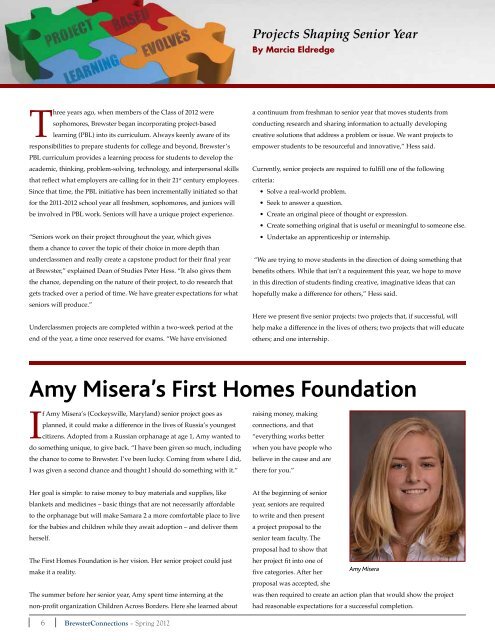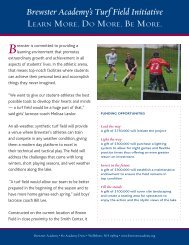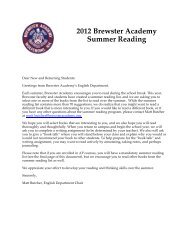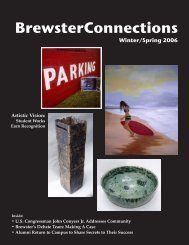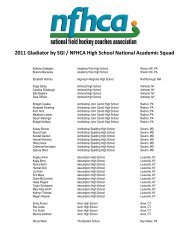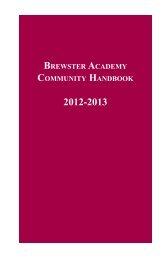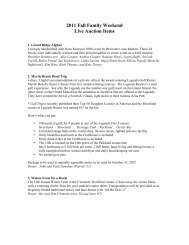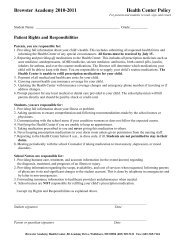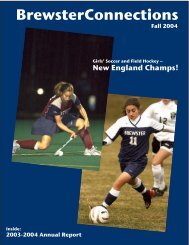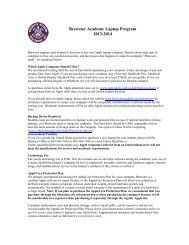BrewsterConnections(PDF) - Brewster Academy
BrewsterConnections(PDF) - Brewster Academy
BrewsterConnections(PDF) - Brewster Academy
You also want an ePaper? Increase the reach of your titles
YUMPU automatically turns print PDFs into web optimized ePapers that Google loves.
Projects Shaping Senior Year<br />
By Marcia Eldredge<br />
Three years ago, when members of the Class of 2012 were<br />
sophomores, <strong>Brewster</strong> began incorporating project-based<br />
learning (PBL) into its curriculum. Always keenly aware of its<br />
responsibilities to prepare students for college and beyond, <strong>Brewster</strong>’s<br />
PBL curriculum provides a learning process for students to develop the<br />
academic, thinking, problem-solving, technology, and interpersonal skills<br />
that reflect what employers are calling for in their 21 st century employees.<br />
Since that time, the PBL initiative has been incrementally initiated so that<br />
for the 2011-2012 school year all freshmen, sophomores, and juniors will<br />
be involved in PBL work. Seniors will have a unique project experience.<br />
“Seniors work on their project throughout the year, which gives<br />
them a chance to cover the topic of their choice in more depth than<br />
underclassmen and really create a capstone product for their final year<br />
at <strong>Brewster</strong>,” explained Dean of Studies Peter Hess. “It also gives them<br />
the chance, depending on the nature of their project, to do research that<br />
gets tracked over a period of time. We have greater expectations for what<br />
seniors will produce.”<br />
Underclassmen projects are completed within a two-week period at the<br />
end of the year, a time once reserved for exams. “We have envisioned<br />
a continuum from freshman to senior year that moves students from<br />
conducting research and sharing information to actually developing<br />
creative solutions that address a problem or issue. We want projects to<br />
empower students to be resourceful and innovative,” Hess said.<br />
Currently, senior projects are required to fulfill one of the following<br />
criteria:<br />
• Solve a real-world problem.<br />
• Seek to answer a question.<br />
• Create an original piece of thought or expression.<br />
• Create something original that is useful or meaningful to someone else.<br />
• Undertake an apprenticeship or internship.<br />
“We are trying to move students in the direction of doing something that<br />
benefits others. While that isn’t a requirement this year, we hope to move<br />
in this direction of students finding creative, imaginative ideas that can<br />
hopefully make a difference for others,” Hess said.<br />
Here we present five senior projects: two projects that, if successful, will<br />
help make a difference in the lives of others; two projects that will educate<br />
others; and one internship.<br />
Amy Misera’s First Homes Foundation<br />
If Amy Misera’s (Cockeysville, Maryland) senior project goes as<br />
planned, it could make a difference in the lives of Russia’s youngest<br />
citizens. Adopted from a Russian orphanage at age 1, Amy wanted to<br />
do something unique, to give back. “I have been given so much, including<br />
the chance to come to <strong>Brewster</strong>. I’ve been lucky. Coming from where I did,<br />
I was given a second chance and thought I should do something with it.”<br />
raising money, making<br />
connections, and that<br />
“everything works better<br />
when you have people who<br />
believe in the cause and are<br />
there for you.”<br />
Her goal is simple: to raise money to buy materials and supplies, like<br />
blankets and medicines – basic things that are not necessarily affordable<br />
to the orphanage but will make Samara 2 a more comfortable place to live<br />
for the babies and children while they await adoption – and deliver them<br />
herself.<br />
The First Homes Foundation is her vision. Her senior project could just<br />
make it a reality.<br />
The summer before her senior year, Amy spent time interning at the<br />
non-profit organization Children Across Borders. Here she learned about<br />
At the beginning of senior<br />
year, seniors are required<br />
to write and then present<br />
a project proposal to the<br />
senior team faculty. The<br />
proposal had to show that<br />
her project fit into one of<br />
five categories. After her<br />
Amy Misera<br />
proposal was accepted, she<br />
was then required to create an action plan that would show the project<br />
had reasonable expectations for a successful completion.<br />
6 <strong><strong>Brewster</strong>Connections</strong> – Spring 2012


